Researching Emotional Intelligence in Project Management at Alshaya
VerifiedAdded on 2023/04/07
|10
|1814
|294
Project
AI Summary
This research project investigates the implications of emotional intelligence (EI) on project management within M.H. Alshaya Co. The study aims to define emotional intelligence and project management, explore their relationship within the Alshaya context, and recommend EI-related strategies. It addresses research questions concerning the meaning of EI and project management, the implications of EI on project management at Alshaya, and the specific EI strategies employed by the company. The research methodology employs both qualitative and quantitative research designs, utilizing primary data collection through questionnaires distributed to 150 Alshaya employees. Data analysis involves statistical and non-statistical methods, including Ms-Excel and content analysis. The expected outcomes include a comprehensive understanding of EI's impact on project management, knowledge of various EI models (specifically the Goleman EI model), and insights into managing projects effectively through EI.
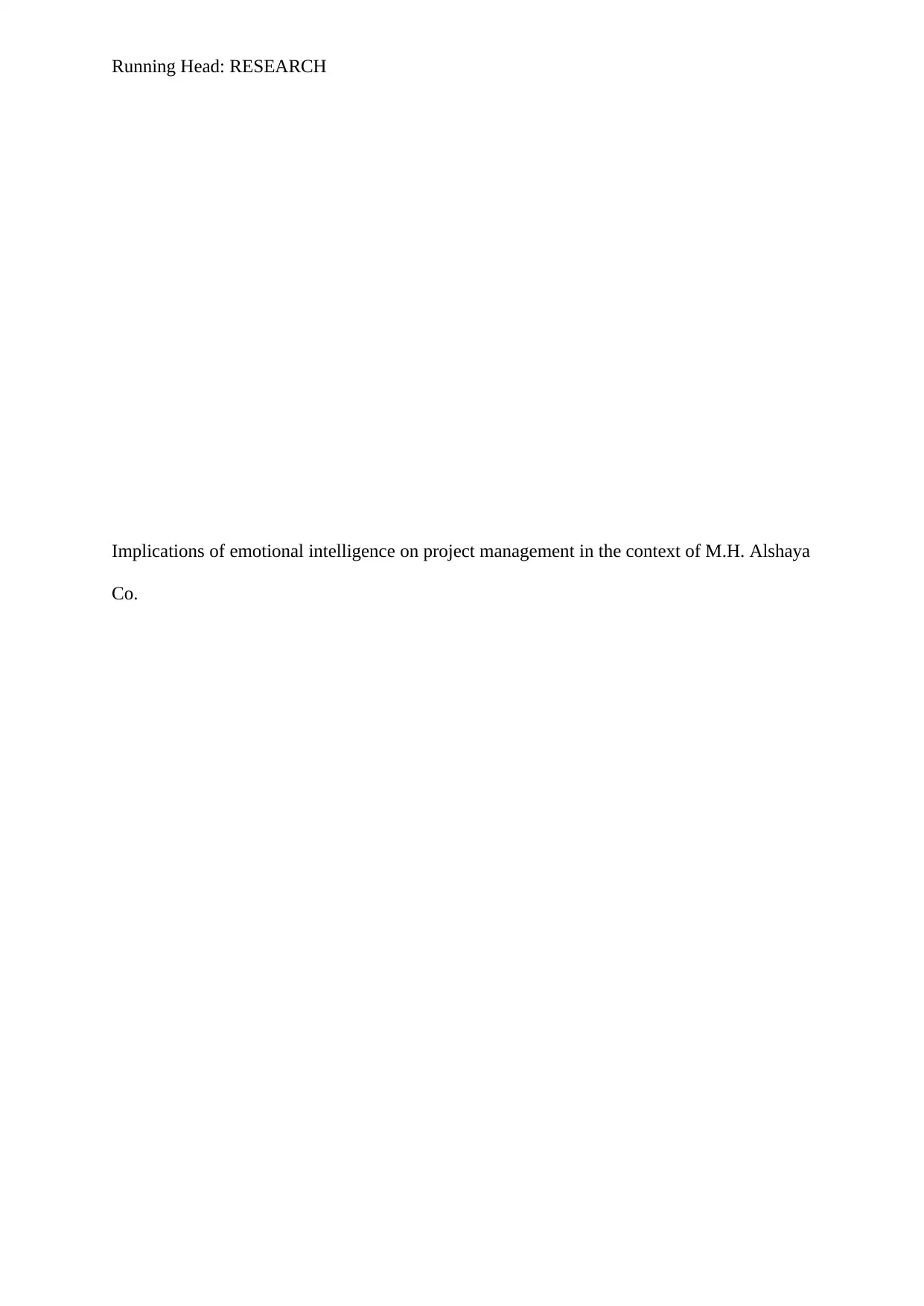
Running Head: RESEARCH
Implications of emotional intelligence on project management in the context of M.H. Alshaya
Co.
Implications of emotional intelligence on project management in the context of M.H. Alshaya
Co.
Paraphrase This Document
Need a fresh take? Get an instant paraphrase of this document with our AI Paraphraser
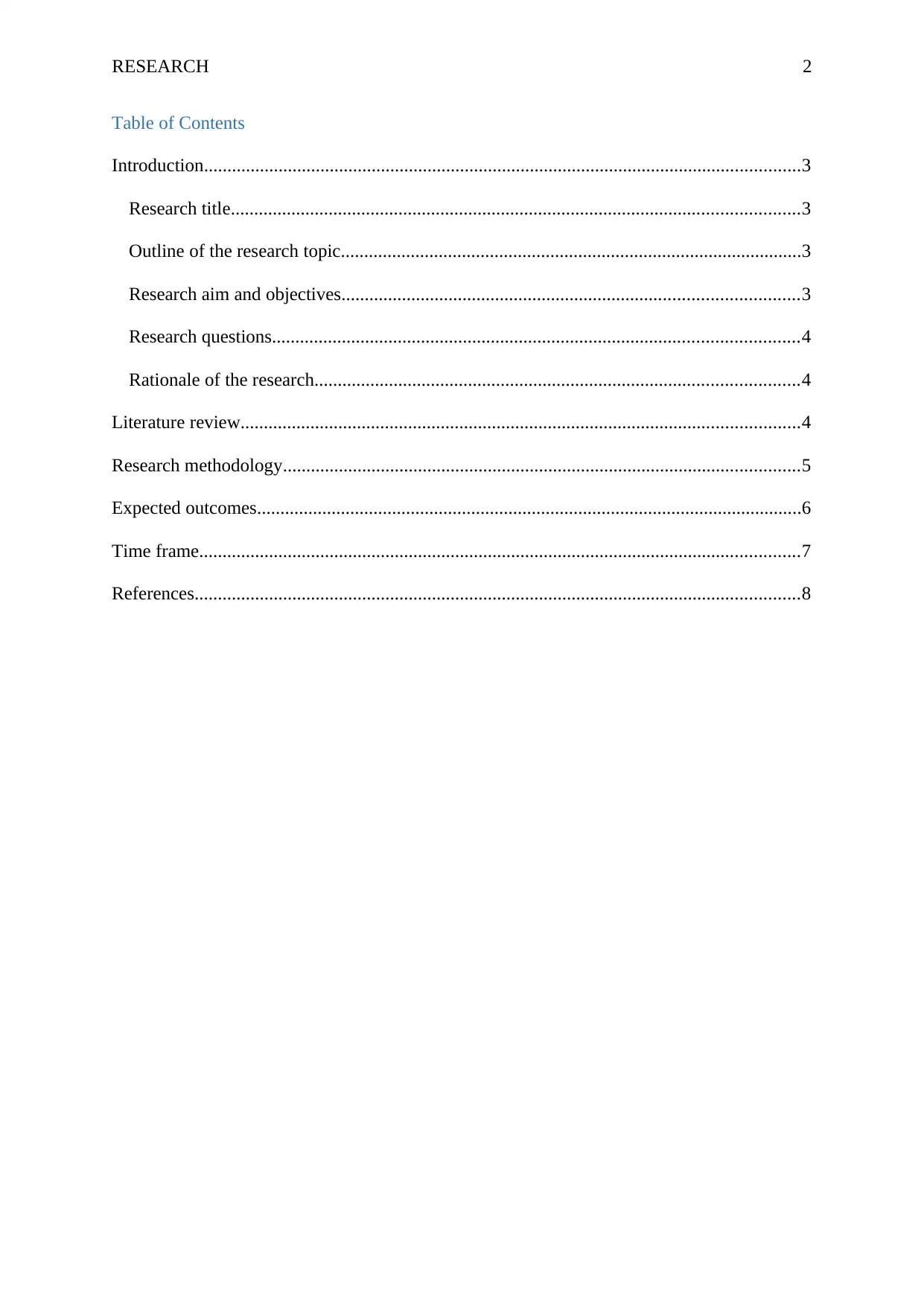
RESEARCH 2
Table of Contents
Introduction................................................................................................................................3
Research title..........................................................................................................................3
Outline of the research topic...................................................................................................3
Research aim and objectives..................................................................................................3
Research questions.................................................................................................................4
Rationale of the research........................................................................................................4
Literature review........................................................................................................................4
Research methodology...............................................................................................................5
Expected outcomes.....................................................................................................................6
Time frame.................................................................................................................................7
References..................................................................................................................................8
Table of Contents
Introduction................................................................................................................................3
Research title..........................................................................................................................3
Outline of the research topic...................................................................................................3
Research aim and objectives..................................................................................................3
Research questions.................................................................................................................4
Rationale of the research........................................................................................................4
Literature review........................................................................................................................4
Research methodology...............................................................................................................5
Expected outcomes.....................................................................................................................6
Time frame.................................................................................................................................7
References..................................................................................................................................8
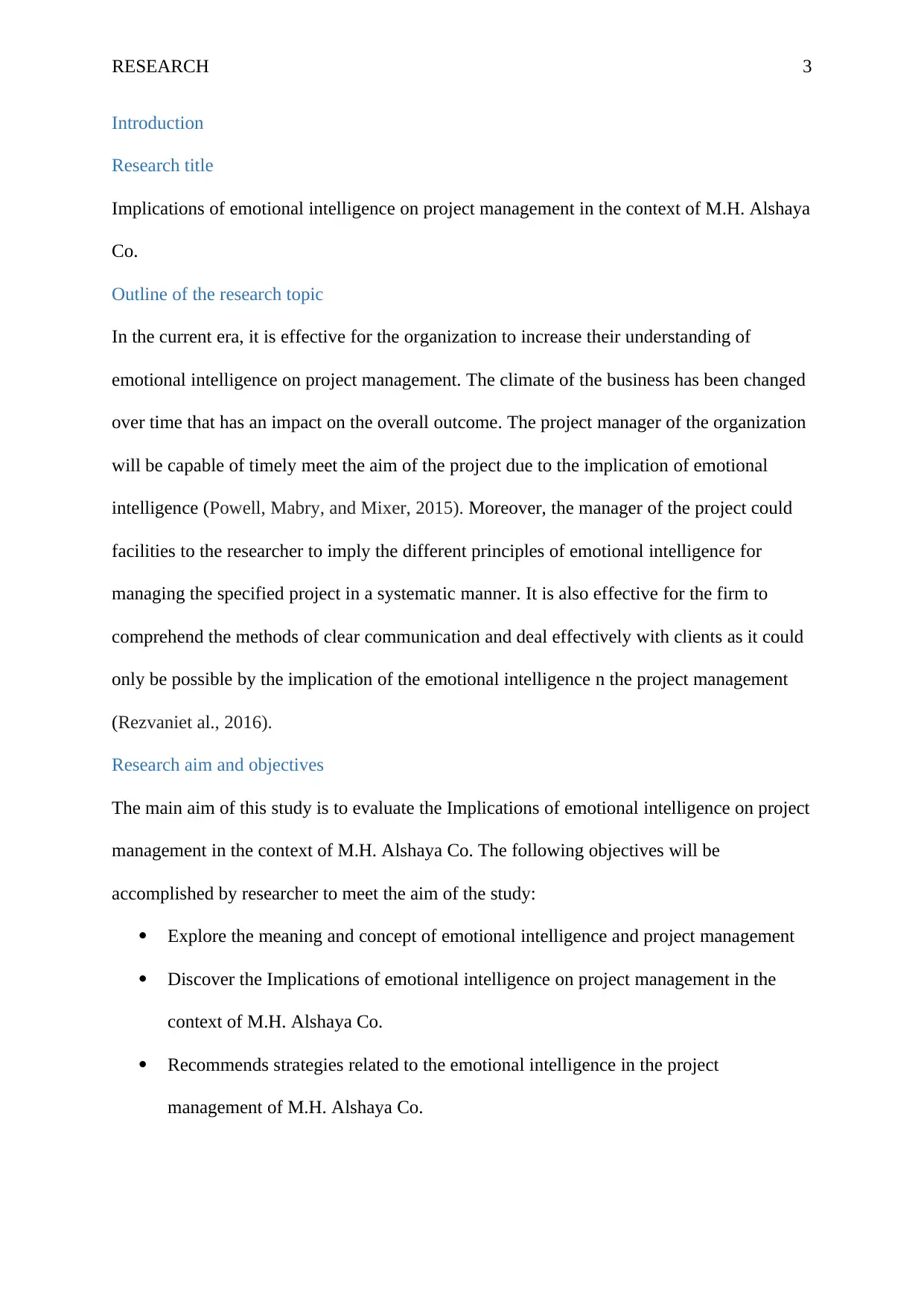
RESEARCH 3
Introduction
Research title
Implications of emotional intelligence on project management in the context of M.H. Alshaya
Co.
Outline of the research topic
In the current era, it is effective for the organization to increase their understanding of
emotional intelligence on project management. The climate of the business has been changed
over time that has an impact on the overall outcome. The project manager of the organization
will be capable of timely meet the aim of the project due to the implication of emotional
intelligence (Powell, Mabry, and Mixer, 2015). Moreover, the manager of the project could
facilities to the researcher to imply the different principles of emotional intelligence for
managing the specified project in a systematic manner. It is also effective for the firm to
comprehend the methods of clear communication and deal effectively with clients as it could
only be possible by the implication of the emotional intelligence n the project management
(Rezvaniet al., 2016).
Research aim and objectives
The main aim of this study is to evaluate the Implications of emotional intelligence on project
management in the context of M.H. Alshaya Co. The following objectives will be
accomplished by researcher to meet the aim of the study:
Explore the meaning and concept of emotional intelligence and project management
Discover the Implications of emotional intelligence on project management in the
context of M.H. Alshaya Co.
Recommends strategies related to the emotional intelligence in the project
management of M.H. Alshaya Co.
Introduction
Research title
Implications of emotional intelligence on project management in the context of M.H. Alshaya
Co.
Outline of the research topic
In the current era, it is effective for the organization to increase their understanding of
emotional intelligence on project management. The climate of the business has been changed
over time that has an impact on the overall outcome. The project manager of the organization
will be capable of timely meet the aim of the project due to the implication of emotional
intelligence (Powell, Mabry, and Mixer, 2015). Moreover, the manager of the project could
facilities to the researcher to imply the different principles of emotional intelligence for
managing the specified project in a systematic manner. It is also effective for the firm to
comprehend the methods of clear communication and deal effectively with clients as it could
only be possible by the implication of the emotional intelligence n the project management
(Rezvaniet al., 2016).
Research aim and objectives
The main aim of this study is to evaluate the Implications of emotional intelligence on project
management in the context of M.H. Alshaya Co. The following objectives will be
accomplished by researcher to meet the aim of the study:
Explore the meaning and concept of emotional intelligence and project management
Discover the Implications of emotional intelligence on project management in the
context of M.H. Alshaya Co.
Recommends strategies related to the emotional intelligence in the project
management of M.H. Alshaya Co.
⊘ This is a preview!⊘
Do you want full access?
Subscribe today to unlock all pages.

Trusted by 1+ million students worldwide
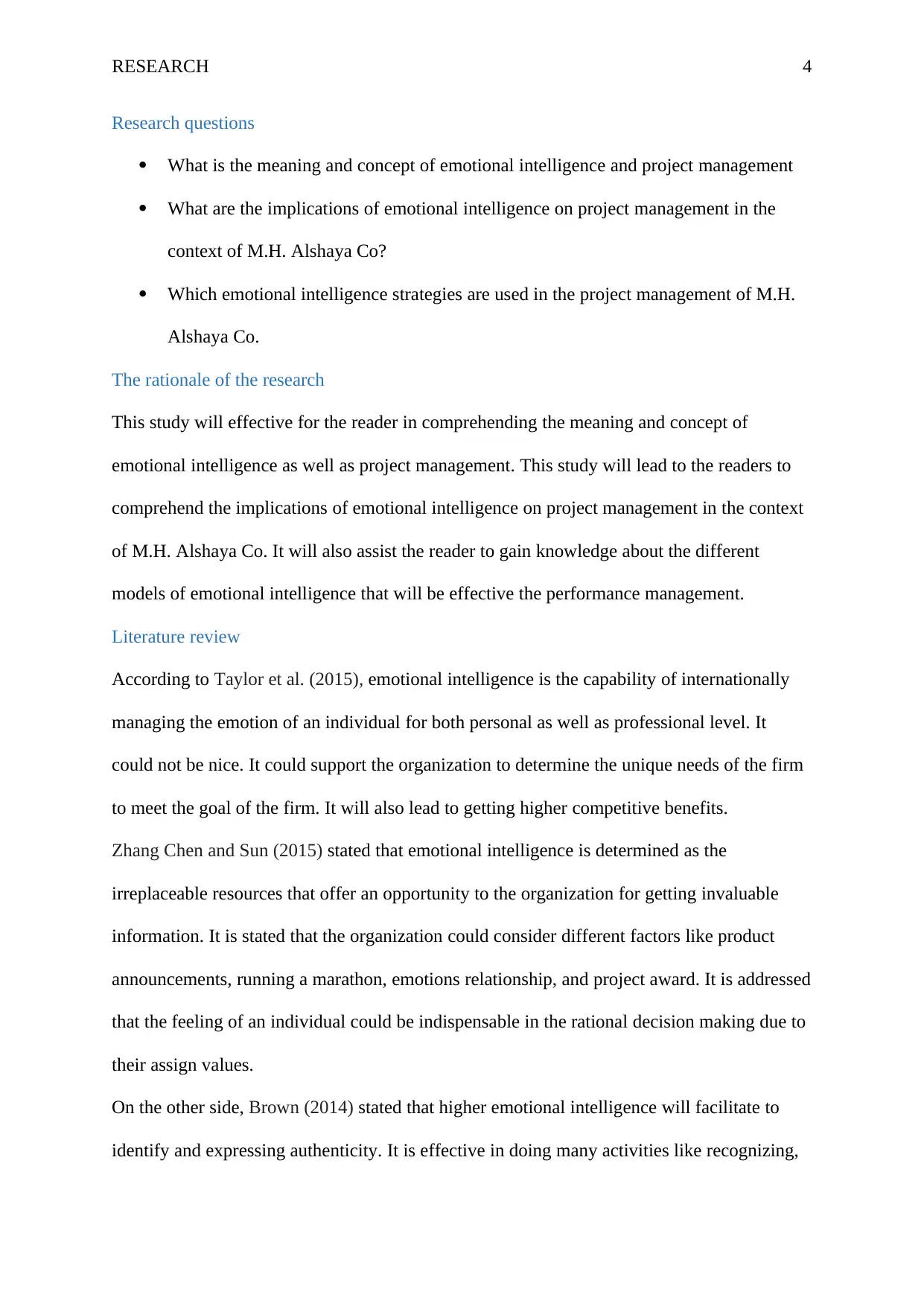
RESEARCH 4
Research questions
What is the meaning and concept of emotional intelligence and project management
What are the implications of emotional intelligence on project management in the
context of M.H. Alshaya Co?
Which emotional intelligence strategies are used in the project management of M.H.
Alshaya Co.
The rationale of the research
This study will effective for the reader in comprehending the meaning and concept of
emotional intelligence as well as project management. This study will lead to the readers to
comprehend the implications of emotional intelligence on project management in the context
of M.H. Alshaya Co. It will also assist the reader to gain knowledge about the different
models of emotional intelligence that will be effective the performance management.
Literature review
According to Taylor et al. (2015), emotional intelligence is the capability of internationally
managing the emotion of an individual for both personal as well as professional level. It
could not be nice. It could support the organization to determine the unique needs of the firm
to meet the goal of the firm. It will also lead to getting higher competitive benefits.
Zhang Chen and Sun (2015) stated that emotional intelligence is determined as the
irreplaceable resources that offer an opportunity to the organization for getting invaluable
information. It is stated that the organization could consider different factors like product
announcements, running a marathon, emotions relationship, and project award. It is addressed
that the feeling of an individual could be indispensable in the rational decision making due to
their assign values.
On the other side, Brown (2014) stated that higher emotional intelligence will facilitate to
identify and expressing authenticity. It is effective in doing many activities like recognizing,
Research questions
What is the meaning and concept of emotional intelligence and project management
What are the implications of emotional intelligence on project management in the
context of M.H. Alshaya Co?
Which emotional intelligence strategies are used in the project management of M.H.
Alshaya Co.
The rationale of the research
This study will effective for the reader in comprehending the meaning and concept of
emotional intelligence as well as project management. This study will lead to the readers to
comprehend the implications of emotional intelligence on project management in the context
of M.H. Alshaya Co. It will also assist the reader to gain knowledge about the different
models of emotional intelligence that will be effective the performance management.
Literature review
According to Taylor et al. (2015), emotional intelligence is the capability of internationally
managing the emotion of an individual for both personal as well as professional level. It
could not be nice. It could support the organization to determine the unique needs of the firm
to meet the goal of the firm. It will also lead to getting higher competitive benefits.
Zhang Chen and Sun (2015) stated that emotional intelligence is determined as the
irreplaceable resources that offer an opportunity to the organization for getting invaluable
information. It is stated that the organization could consider different factors like product
announcements, running a marathon, emotions relationship, and project award. It is addressed
that the feeling of an individual could be indispensable in the rational decision making due to
their assign values.
On the other side, Brown (2014) stated that higher emotional intelligence will facilitate to
identify and expressing authenticity. It is effective in doing many activities like recognizing,
Paraphrase This Document
Need a fresh take? Get an instant paraphrase of this document with our AI Paraphraser
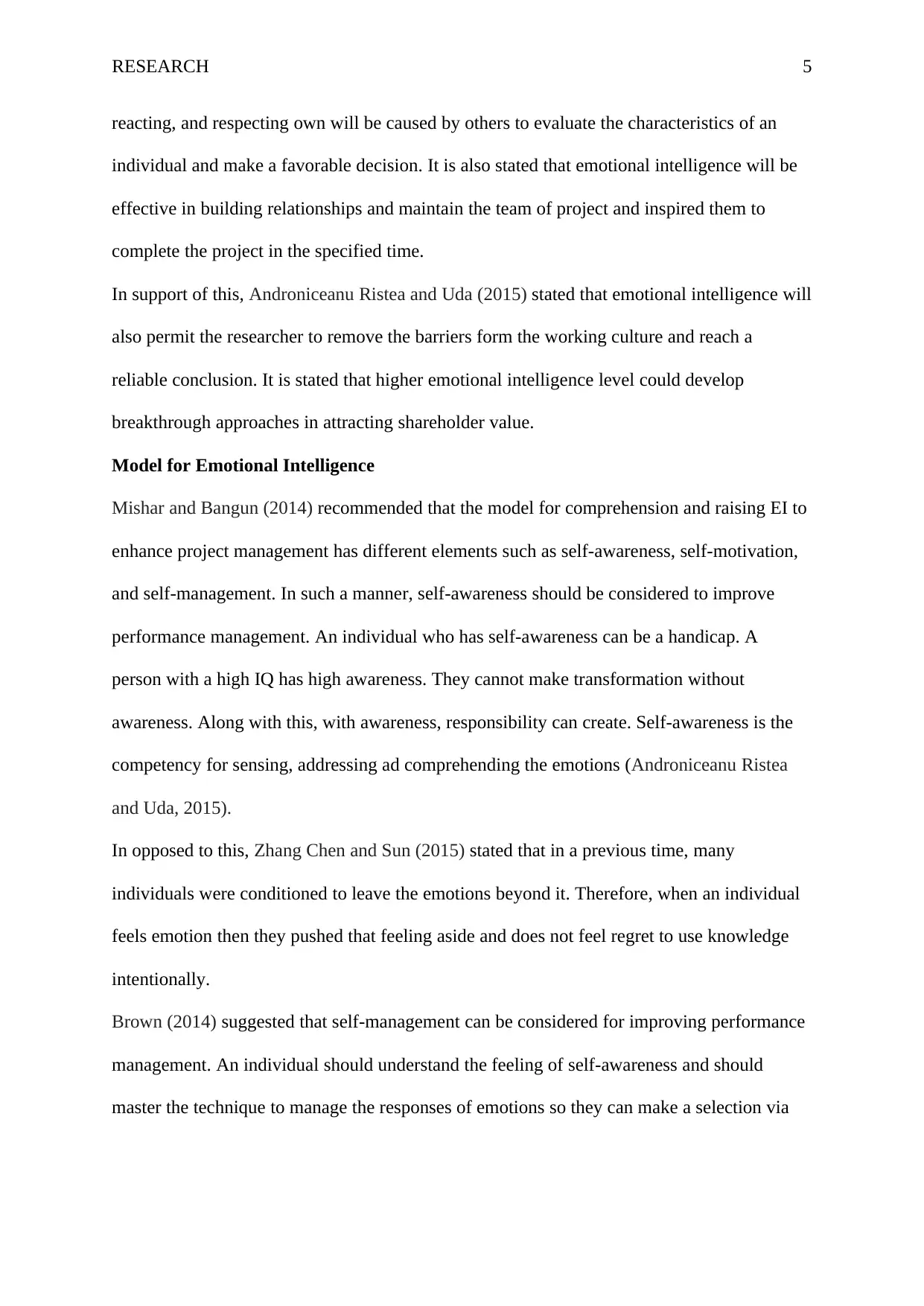
RESEARCH 5
reacting, and respecting own will be caused by others to evaluate the characteristics of an
individual and make a favorable decision. It is also stated that emotional intelligence will be
effective in building relationships and maintain the team of project and inspired them to
complete the project in the specified time.
In support of this, Androniceanu Ristea and Uda (2015) stated that emotional intelligence will
also permit the researcher to remove the barriers form the working culture and reach a
reliable conclusion. It is stated that higher emotional intelligence level could develop
breakthrough approaches in attracting shareholder value.
Model for Emotional Intelligence
Mishar and Bangun (2014) recommended that the model for comprehension and raising EI to
enhance project management has different elements such as self-awareness, self-motivation,
and self-management. In such a manner, self-awareness should be considered to improve
performance management. An individual who has self-awareness can be a handicap. A
person with a high IQ has high awareness. They cannot make transformation without
awareness. Along with this, with awareness, responsibility can create. Self-awareness is the
competency for sensing, addressing ad comprehending the emotions (Androniceanu Ristea
and Uda, 2015).
In opposed to this, Zhang Chen and Sun (2015) stated that in a previous time, many
individuals were conditioned to leave the emotions beyond it. Therefore, when an individual
feels emotion then they pushed that feeling aside and does not feel regret to use knowledge
intentionally.
Brown (2014) suggested that self-management can be considered for improving performance
management. An individual should understand the feeling of self-awareness and should
master the technique to manage the responses of emotions so they can make a selection via
reacting, and respecting own will be caused by others to evaluate the characteristics of an
individual and make a favorable decision. It is also stated that emotional intelligence will be
effective in building relationships and maintain the team of project and inspired them to
complete the project in the specified time.
In support of this, Androniceanu Ristea and Uda (2015) stated that emotional intelligence will
also permit the researcher to remove the barriers form the working culture and reach a
reliable conclusion. It is stated that higher emotional intelligence level could develop
breakthrough approaches in attracting shareholder value.
Model for Emotional Intelligence
Mishar and Bangun (2014) recommended that the model for comprehension and raising EI to
enhance project management has different elements such as self-awareness, self-motivation,
and self-management. In such a manner, self-awareness should be considered to improve
performance management. An individual who has self-awareness can be a handicap. A
person with a high IQ has high awareness. They cannot make transformation without
awareness. Along with this, with awareness, responsibility can create. Self-awareness is the
competency for sensing, addressing ad comprehending the emotions (Androniceanu Ristea
and Uda, 2015).
In opposed to this, Zhang Chen and Sun (2015) stated that in a previous time, many
individuals were conditioned to leave the emotions beyond it. Therefore, when an individual
feels emotion then they pushed that feeling aside and does not feel regret to use knowledge
intentionally.
Brown (2014) suggested that self-management can be considered for improving performance
management. An individual should understand the feeling of self-awareness and should
master the technique to manage the responses of emotions so they can make a selection via
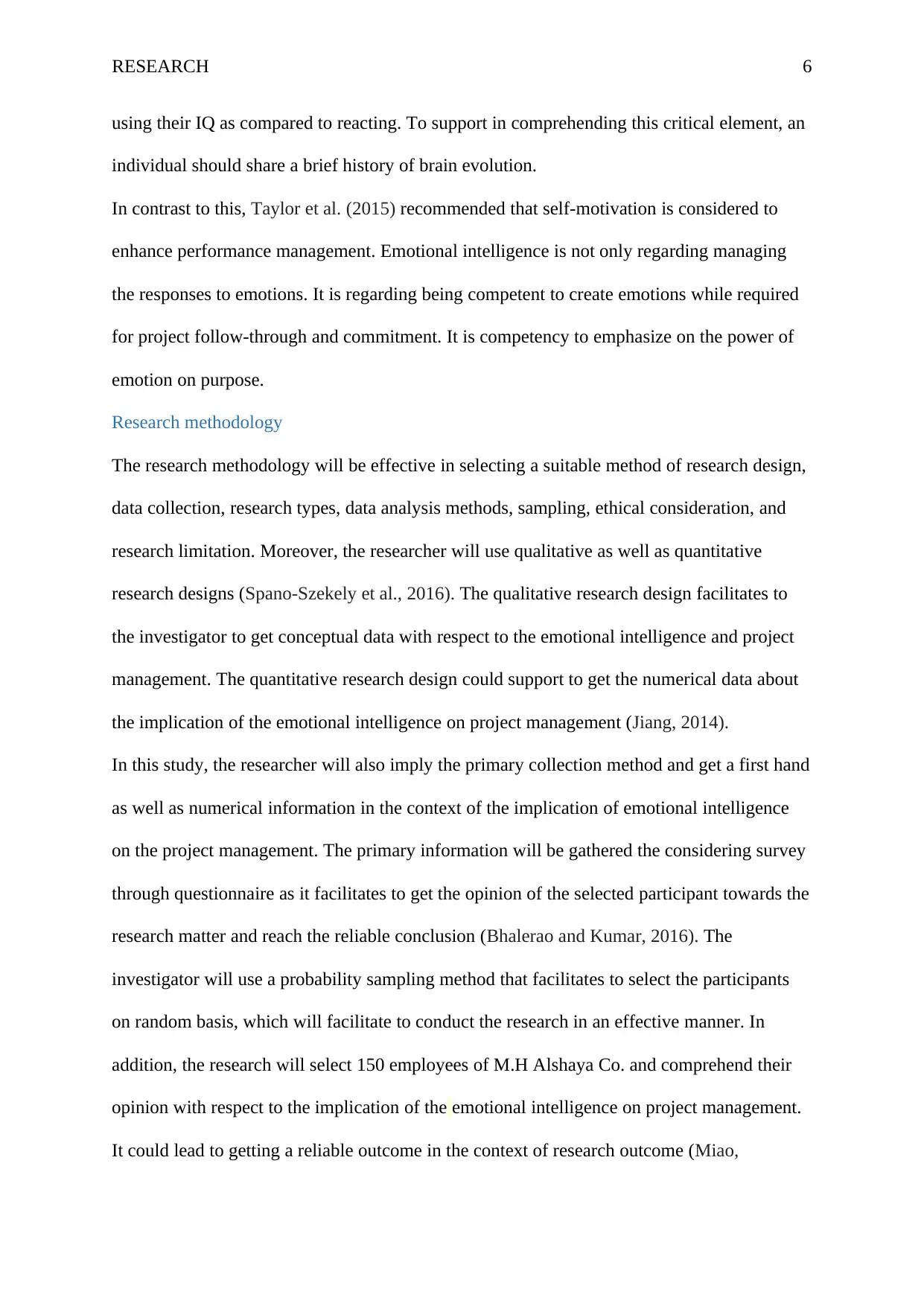
RESEARCH 6
using their IQ as compared to reacting. To support in comprehending this critical element, an
individual should share a brief history of brain evolution.
In contrast to this, Taylor et al. (2015) recommended that self-motivation is considered to
enhance performance management. Emotional intelligence is not only regarding managing
the responses to emotions. It is regarding being competent to create emotions while required
for project follow-through and commitment. It is competency to emphasize on the power of
emotion on purpose.
Research methodology
The research methodology will be effective in selecting a suitable method of research design,
data collection, research types, data analysis methods, sampling, ethical consideration, and
research limitation. Moreover, the researcher will use qualitative as well as quantitative
research designs (Spano-Szekely et al., 2016). The qualitative research design facilitates to
the investigator to get conceptual data with respect to the emotional intelligence and project
management. The quantitative research design could support to get the numerical data about
the implication of the emotional intelligence on project management (Jiang, 2014).
In this study, the researcher will also imply the primary collection method and get a first hand
as well as numerical information in the context of the implication of emotional intelligence
on the project management. The primary information will be gathered the considering survey
through questionnaire as it facilitates to get the opinion of the selected participant towards the
research matter and reach the reliable conclusion (Bhalerao and Kumar, 2016). The
investigator will use a probability sampling method that facilitates to select the participants
on random basis, which will facilitate to conduct the research in an effective manner. In
addition, the research will select 150 employees of M.H Alshaya Co. and comprehend their
opinion with respect to the implication of the emotional intelligence on project management.
It could lead to getting a reliable outcome in the context of research outcome (Miao,
using their IQ as compared to reacting. To support in comprehending this critical element, an
individual should share a brief history of brain evolution.
In contrast to this, Taylor et al. (2015) recommended that self-motivation is considered to
enhance performance management. Emotional intelligence is not only regarding managing
the responses to emotions. It is regarding being competent to create emotions while required
for project follow-through and commitment. It is competency to emphasize on the power of
emotion on purpose.
Research methodology
The research methodology will be effective in selecting a suitable method of research design,
data collection, research types, data analysis methods, sampling, ethical consideration, and
research limitation. Moreover, the researcher will use qualitative as well as quantitative
research designs (Spano-Szekely et al., 2016). The qualitative research design facilitates to
the investigator to get conceptual data with respect to the emotional intelligence and project
management. The quantitative research design could support to get the numerical data about
the implication of the emotional intelligence on project management (Jiang, 2014).
In this study, the researcher will also imply the primary collection method and get a first hand
as well as numerical information in the context of the implication of emotional intelligence
on the project management. The primary information will be gathered the considering survey
through questionnaire as it facilitates to get the opinion of the selected participant towards the
research matter and reach the reliable conclusion (Bhalerao and Kumar, 2016). The
investigator will use a probability sampling method that facilitates to select the participants
on random basis, which will facilitate to conduct the research in an effective manner. In
addition, the research will select 150 employees of M.H Alshaya Co. and comprehend their
opinion with respect to the implication of the emotional intelligence on project management.
It could lead to getting a reliable outcome in the context of research outcome (Miao,
⊘ This is a preview!⊘
Do you want full access?
Subscribe today to unlock all pages.

Trusted by 1+ million students worldwide
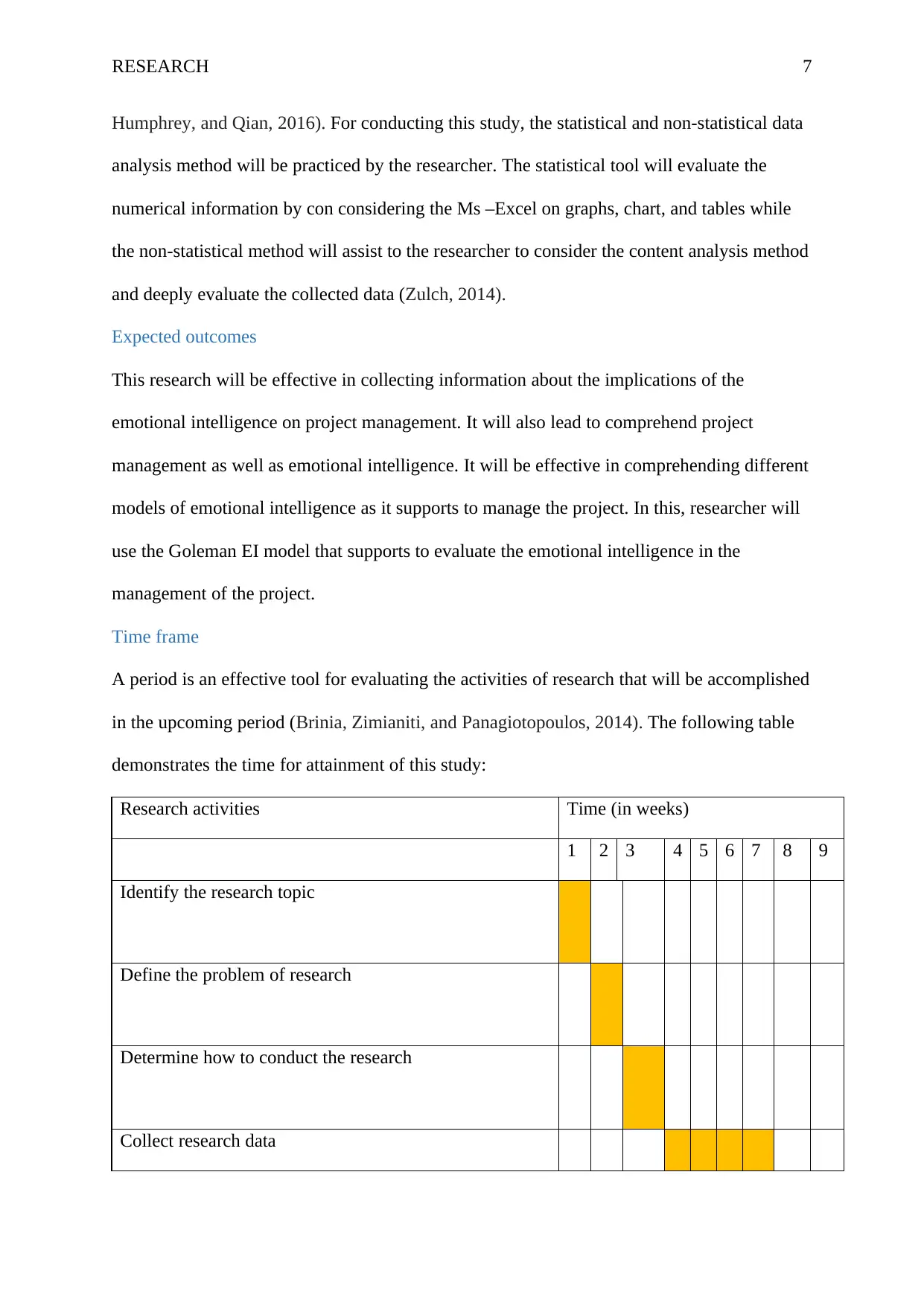
RESEARCH 7
Humphrey, and Qian, 2016). For conducting this study, the statistical and non-statistical data
analysis method will be practiced by the researcher. The statistical tool will evaluate the
numerical information by con considering the Ms –Excel on graphs, chart, and tables while
the non-statistical method will assist to the researcher to consider the content analysis method
and deeply evaluate the collected data (Zulch, 2014).
Expected outcomes
This research will be effective in collecting information about the implications of the
emotional intelligence on project management. It will also lead to comprehend project
management as well as emotional intelligence. It will be effective in comprehending different
models of emotional intelligence as it supports to manage the project. In this, researcher will
use the Goleman EI model that supports to evaluate the emotional intelligence in the
management of the project.
Time frame
A period is an effective tool for evaluating the activities of research that will be accomplished
in the upcoming period (Brinia, Zimianiti, and Panagiotopoulos, 2014). The following table
demonstrates the time for attainment of this study:
Research activities Time (in weeks)
1 2 3 4 5 6 7 8 9
Identify the research topic
Define the problem of research
Determine how to conduct the research
Collect research data
Humphrey, and Qian, 2016). For conducting this study, the statistical and non-statistical data
analysis method will be practiced by the researcher. The statistical tool will evaluate the
numerical information by con considering the Ms –Excel on graphs, chart, and tables while
the non-statistical method will assist to the researcher to consider the content analysis method
and deeply evaluate the collected data (Zulch, 2014).
Expected outcomes
This research will be effective in collecting information about the implications of the
emotional intelligence on project management. It will also lead to comprehend project
management as well as emotional intelligence. It will be effective in comprehending different
models of emotional intelligence as it supports to manage the project. In this, researcher will
use the Goleman EI model that supports to evaluate the emotional intelligence in the
management of the project.
Time frame
A period is an effective tool for evaluating the activities of research that will be accomplished
in the upcoming period (Brinia, Zimianiti, and Panagiotopoulos, 2014). The following table
demonstrates the time for attainment of this study:
Research activities Time (in weeks)
1 2 3 4 5 6 7 8 9
Identify the research topic
Define the problem of research
Determine how to conduct the research
Collect research data
Paraphrase This Document
Need a fresh take? Get an instant paraphrase of this document with our AI Paraphraser
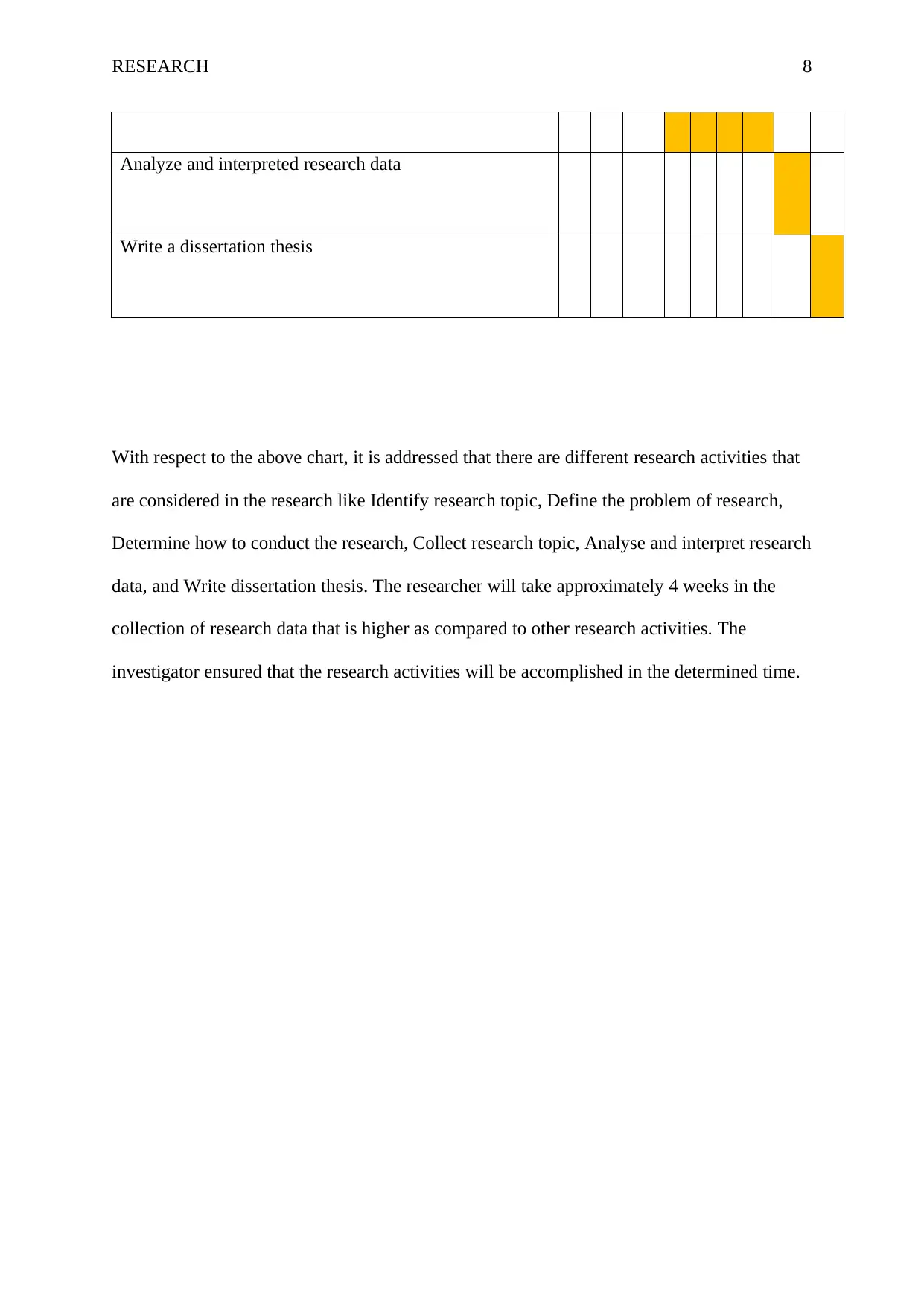
RESEARCH 8
Analyze and interpreted research data
Write a dissertation thesis
With respect to the above chart, it is addressed that there are different research activities that
are considered in the research like Identify research topic, Define the problem of research,
Determine how to conduct the research, Collect research topic, Analyse and interpret research
data, and Write dissertation thesis. The researcher will take approximately 4 weeks in the
collection of research data that is higher as compared to other research activities. The
investigator ensured that the research activities will be accomplished in the determined time.
Analyze and interpreted research data
Write a dissertation thesis
With respect to the above chart, it is addressed that there are different research activities that
are considered in the research like Identify research topic, Define the problem of research,
Determine how to conduct the research, Collect research topic, Analyse and interpret research
data, and Write dissertation thesis. The researcher will take approximately 4 weeks in the
collection of research data that is higher as compared to other research activities. The
investigator ensured that the research activities will be accomplished in the determined time.
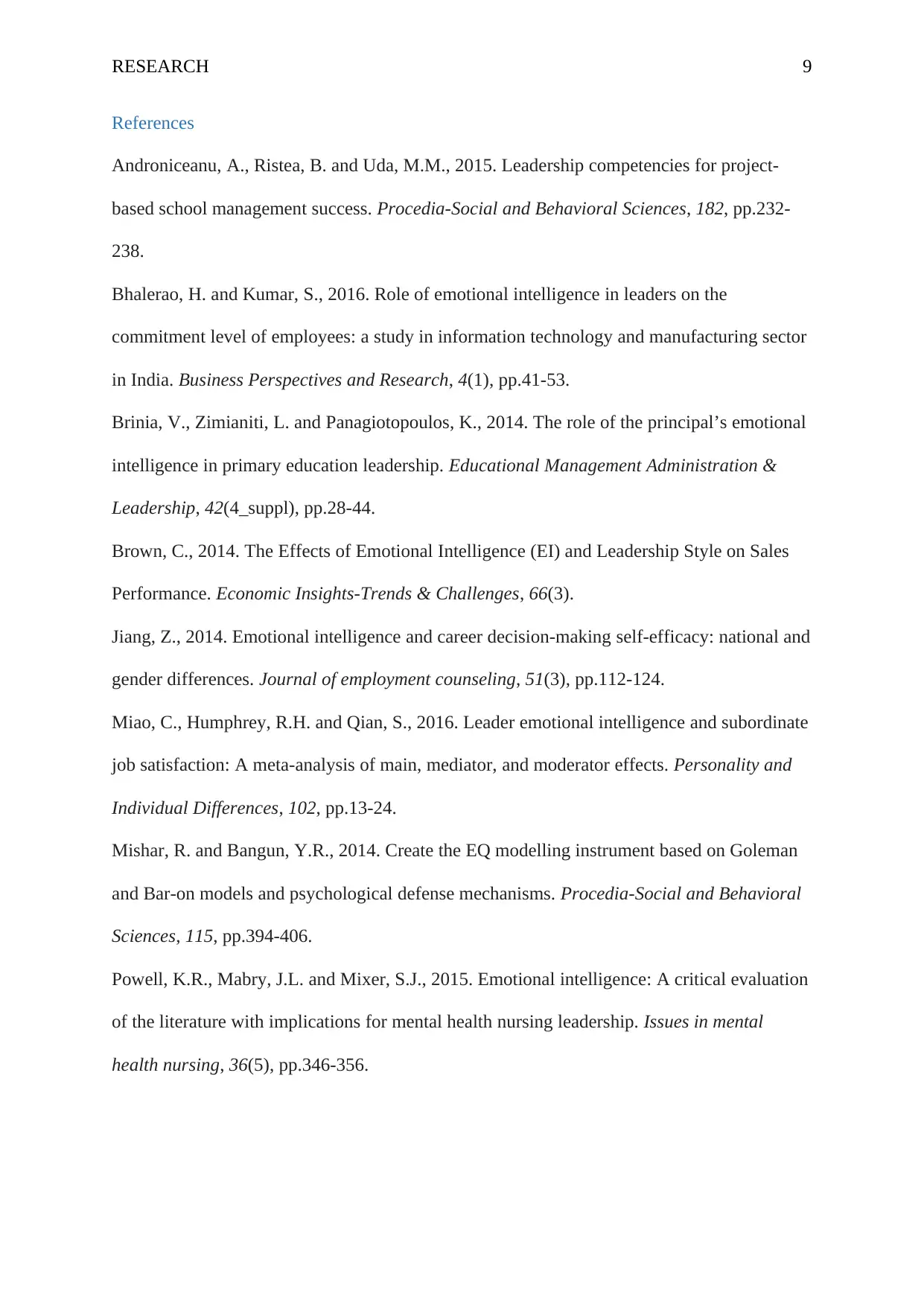
RESEARCH 9
References
Androniceanu, A., Ristea, B. and Uda, M.M., 2015. Leadership competencies for project-
based school management success. Procedia-Social and Behavioral Sciences, 182, pp.232-
238.
Bhalerao, H. and Kumar, S., 2016. Role of emotional intelligence in leaders on the
commitment level of employees: a study in information technology and manufacturing sector
in India. Business Perspectives and Research, 4(1), pp.41-53.
Brinia, V., Zimianiti, L. and Panagiotopoulos, K., 2014. The role of the principal’s emotional
intelligence in primary education leadership. Educational Management Administration &
Leadership, 42(4_suppl), pp.28-44.
Brown, C., 2014. The Effects of Emotional Intelligence (EI) and Leadership Style on Sales
Performance. Economic Insights-Trends & Challenges, 66(3).
Jiang, Z., 2014. Emotional intelligence and career decision‐making self‐efficacy: national and
gender differences. Journal of employment counseling, 51(3), pp.112-124.
Miao, C., Humphrey, R.H. and Qian, S., 2016. Leader emotional intelligence and subordinate
job satisfaction: A meta-analysis of main, mediator, and moderator effects. Personality and
Individual Differences, 102, pp.13-24.
Mishar, R. and Bangun, Y.R., 2014. Create the EQ modelling instrument based on Goleman
and Bar-on models and psychological defense mechanisms. Procedia-Social and Behavioral
Sciences, 115, pp.394-406.
Powell, K.R., Mabry, J.L. and Mixer, S.J., 2015. Emotional intelligence: A critical evaluation
of the literature with implications for mental health nursing leadership. Issues in mental
health nursing, 36(5), pp.346-356.
References
Androniceanu, A., Ristea, B. and Uda, M.M., 2015. Leadership competencies for project-
based school management success. Procedia-Social and Behavioral Sciences, 182, pp.232-
238.
Bhalerao, H. and Kumar, S., 2016. Role of emotional intelligence in leaders on the
commitment level of employees: a study in information technology and manufacturing sector
in India. Business Perspectives and Research, 4(1), pp.41-53.
Brinia, V., Zimianiti, L. and Panagiotopoulos, K., 2014. The role of the principal’s emotional
intelligence in primary education leadership. Educational Management Administration &
Leadership, 42(4_suppl), pp.28-44.
Brown, C., 2014. The Effects of Emotional Intelligence (EI) and Leadership Style on Sales
Performance. Economic Insights-Trends & Challenges, 66(3).
Jiang, Z., 2014. Emotional intelligence and career decision‐making self‐efficacy: national and
gender differences. Journal of employment counseling, 51(3), pp.112-124.
Miao, C., Humphrey, R.H. and Qian, S., 2016. Leader emotional intelligence and subordinate
job satisfaction: A meta-analysis of main, mediator, and moderator effects. Personality and
Individual Differences, 102, pp.13-24.
Mishar, R. and Bangun, Y.R., 2014. Create the EQ modelling instrument based on Goleman
and Bar-on models and psychological defense mechanisms. Procedia-Social and Behavioral
Sciences, 115, pp.394-406.
Powell, K.R., Mabry, J.L. and Mixer, S.J., 2015. Emotional intelligence: A critical evaluation
of the literature with implications for mental health nursing leadership. Issues in mental
health nursing, 36(5), pp.346-356.
⊘ This is a preview!⊘
Do you want full access?
Subscribe today to unlock all pages.

Trusted by 1+ million students worldwide
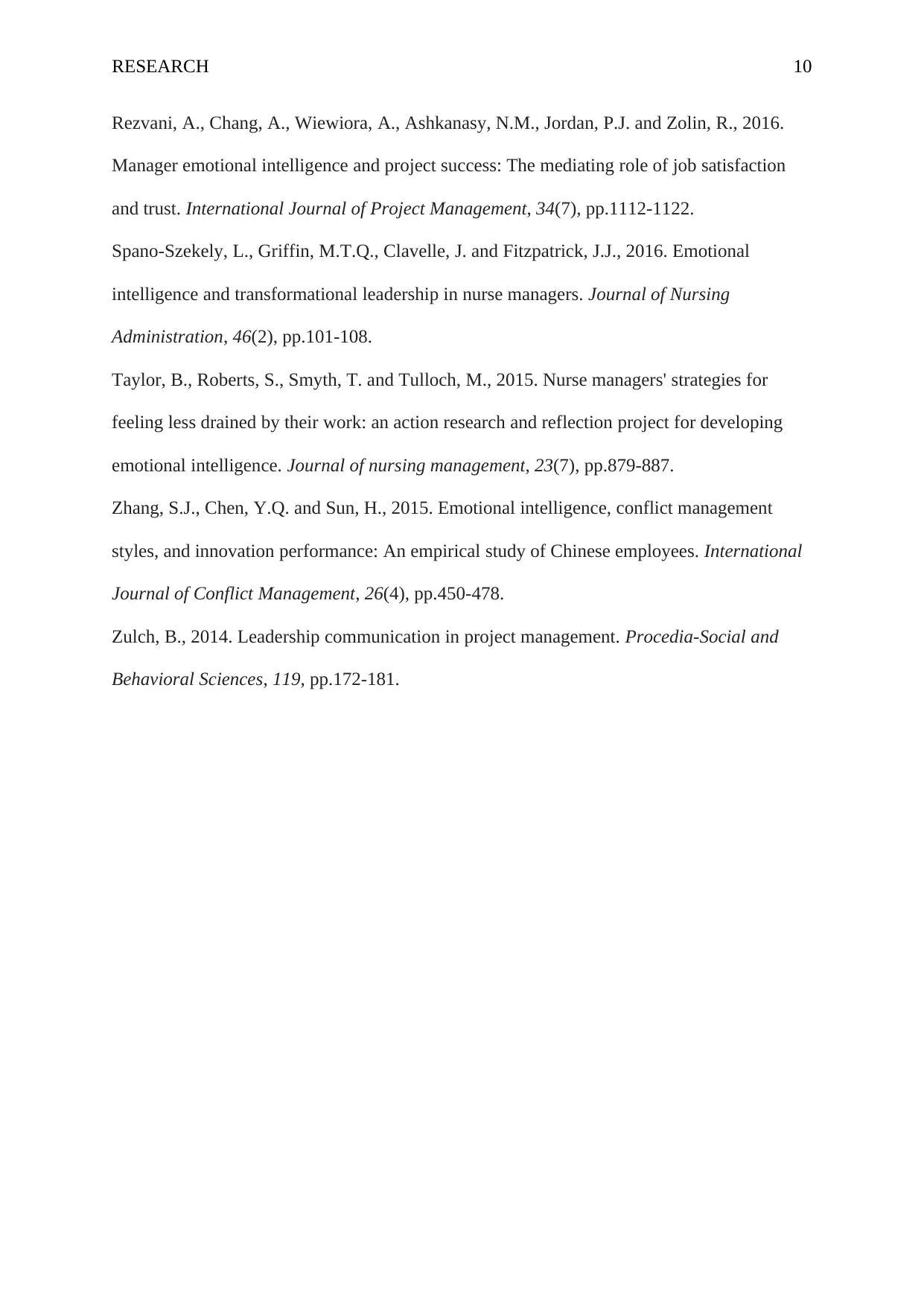
RESEARCH 10
Rezvani, A., Chang, A., Wiewiora, A., Ashkanasy, N.M., Jordan, P.J. and Zolin, R., 2016.
Manager emotional intelligence and project success: The mediating role of job satisfaction
and trust. International Journal of Project Management, 34(7), pp.1112-1122.
Spano-Szekely, L., Griffin, M.T.Q., Clavelle, J. and Fitzpatrick, J.J., 2016. Emotional
intelligence and transformational leadership in nurse managers. Journal of Nursing
Administration, 46(2), pp.101-108.
Taylor, B., Roberts, S., Smyth, T. and Tulloch, M., 2015. Nurse managers' strategies for
feeling less drained by their work: an action research and reflection project for developing
emotional intelligence. Journal of nursing management, 23(7), pp.879-887.
Zhang, S.J., Chen, Y.Q. and Sun, H., 2015. Emotional intelligence, conflict management
styles, and innovation performance: An empirical study of Chinese employees. International
Journal of Conflict Management, 26(4), pp.450-478.
Zulch, B., 2014. Leadership communication in project management. Procedia-Social and
Behavioral Sciences, 119, pp.172-181.
Rezvani, A., Chang, A., Wiewiora, A., Ashkanasy, N.M., Jordan, P.J. and Zolin, R., 2016.
Manager emotional intelligence and project success: The mediating role of job satisfaction
and trust. International Journal of Project Management, 34(7), pp.1112-1122.
Spano-Szekely, L., Griffin, M.T.Q., Clavelle, J. and Fitzpatrick, J.J., 2016. Emotional
intelligence and transformational leadership in nurse managers. Journal of Nursing
Administration, 46(2), pp.101-108.
Taylor, B., Roberts, S., Smyth, T. and Tulloch, M., 2015. Nurse managers' strategies for
feeling less drained by their work: an action research and reflection project for developing
emotional intelligence. Journal of nursing management, 23(7), pp.879-887.
Zhang, S.J., Chen, Y.Q. and Sun, H., 2015. Emotional intelligence, conflict management
styles, and innovation performance: An empirical study of Chinese employees. International
Journal of Conflict Management, 26(4), pp.450-478.
Zulch, B., 2014. Leadership communication in project management. Procedia-Social and
Behavioral Sciences, 119, pp.172-181.
1 out of 10
Related Documents
Your All-in-One AI-Powered Toolkit for Academic Success.
+13062052269
info@desklib.com
Available 24*7 on WhatsApp / Email
![[object Object]](/_next/static/media/star-bottom.7253800d.svg)
Unlock your academic potential
Copyright © 2020–2026 A2Z Services. All Rights Reserved. Developed and managed by ZUCOL.





